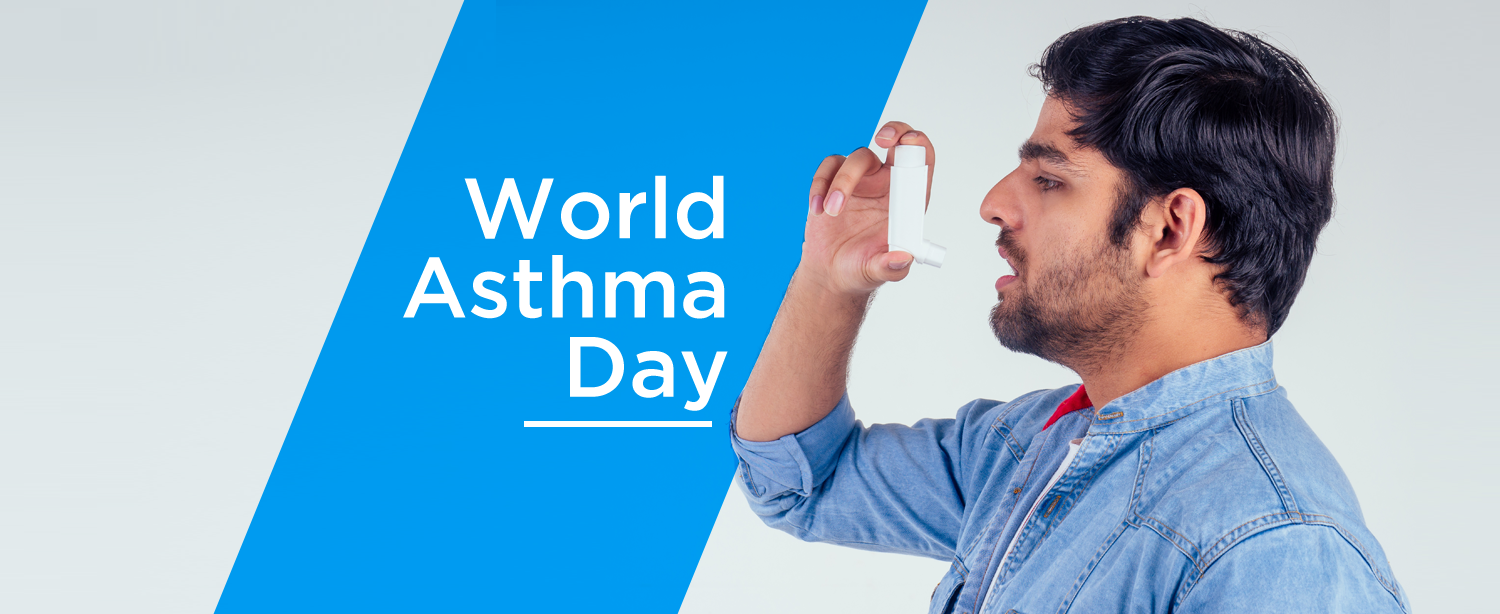5th May 2020 is observed as World Asthma Day. Asthma is a condition in which your airways narrow and swell and produce extra mucus. This can make breathing difficult and trigger coughing, wheezing and shortness of breath. Asthma is a long-term disease of the lungs, it is called chronic respiratory disease. For some people, asthma is a minor ailment. For others, it can be a major problem that interferes with daily activities and may lead to a life-threatening asthma attack. Asthma can’t be cured, however, its symptoms can be controlled. Asthma tends to change over time, hence it is essential to work with your doctor to track your signs and symptoms and adjust treatment as needed.
How is Asthma classified?
Depending on the severity of the disease and how it affects your daily life asthma is classified into:
- Mild intermittent asthma – Mild symptoms less than twice a week. Night-time symptoms less than twice a month. Few asthma attacks.
- Mild persistent asthma – Symptoms three to six times a week. Night-time symptoms three to four times a month. Asthma attacks might affect activities.
- Moderate persistent asthma – Symptoms three to six times a week. Night-time symptoms three to four times a month. Asthma attacks might affect activities.
- Severe persistent asthma – You have ongoing symptoms both day and night. They’re so frequent that you have to limit your activities.
Symptoms of Asthma
Not all people with asthma have the same symptoms, however, the most common symptoms are:
- Shortness of breath, chest tightness.
- Wheezing.
- Coughing during the night.
- Chronic cough.
- A cold that lasts for more than 10 days.
Anyone can get asthma at any age. Sometimes it starts in infancy, other times it starts later in childhood. Although some children seem to “outgrow” asthma, the disease never really goes away, there is just a time when you are not having any breathing problems. Asthma can also start at any time during adulthood, including the senior years. Some people develop asthma after a work-related exposure.
Asthma Causes and Triggers
When you have asthma, your airways react to many different things in the environment called asthma triggers. Contact with these triggers cause asthma symptoms to start or worsen and may lead to an asthma attack. Common asthma triggers include:
- Infections like sinusitis, colds, and flu.
- Tobacco smoke.
- Cold air or changes to the weather.
- Allergens such as pollens, mould, pet dander, and dust mites.
- Irritants like strong odours from perfumes or cleaning solutions.
- Air pollution.
- Strong emotions such as anxiety, or stress.
- Certain medications.
What is an Asthma Attack?
An asthma attack is a sudden worsening of symptoms. With an asthma attack, your airways tighten, swell up, or fill with mucus. Common symptoms include:
- Coughing, especially at night.
- Wheezing.
- Shortness of breath or trouble breathing.
- Chest tightness, pain, or pressure.
Asthma patients are advised to work closely with their doctor to manage asthma and keep it under control. You must carry the prescribed emergency medicine, the quick-relief inhaler at all times with you. Here are a few tips to manage an asthma attack:
- Stay calm, and try to relax.
- Tell someone that you are having asthma symptoms.
- Take the quick-relief medication or your inhaler as prescribed by your doctor.
- If the quick-relief medicine hasn’t helped in 5-10 minutes, seek emergency help.
Asthma and COVID-19
People with moderate to severe asthma may be at higher risk of getting very sick from COVID-19. COVID-19 can affect your respiratory tract (nose, throat, lungs), cause an asthma attack, and possibly lead to pneumonia and acute respiratory disease. Looking at these risk factors it is important for asthmatics to manage their asthma triggers and take their long-term medicine as prescribed to prevent asthma attacks during these times.
Here are a few Do’s for Asthmatics:
- Stay at home as much as possible.
- Wash your hands at regular intervals with soap and water.
- Continue with your asthma medicines.
- Manage your asthma triggers and avoid them.
- Keep your inhalers handy at all times.
- Wash your inhalation devices regularly to keep them hygienic and clean.
Here are a few Don’ts for Asthmatics:
- Do not share your inhaler with anyone else.
- Do not go for non-urgent, and unnecessary doctor visits.
- Do not resort to advance exercise regime. Try and do light exercises at home if required.
Are you or a family member suffering from asthma? Do you need expert advice to manage this disease better? Consult experts at our Department of Pulmonary Medicine. Please find below link for more details:
https://www.kokilabenhospital.com/departments/clinicaldepartments/pulmonarymedicine/asthma.html


